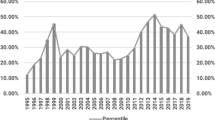Abstract
Are governing parties able to shape social and labor market policies according to their ideological positions or are they overwhelmed by socio-economic and institutional constraints? The paper answers this crucial question by developing a comparative study on 19 OECD countries from 1985 to 2011. It investigates whether the location of governments on a continuous left–right scale affects four measures of welfare state generosity: namely, public spending in social policies, in active and passive labor market policies and the level of unemployment insurance replacement rate. The results obtained through an error correction model show that governing parties are unable to affect social and labor market policies in the short-run, when economic dynamics prevail. However, in the long-run, partisanship gains relevance: when the government coalition moves to the right, there is a negative impact on all the measures of welfare state generosity.


Similar content being viewed by others
Notes
The analysis is replicated by operationalizing partisanship also as the weighted mean of the governing parties’ positions on the RILE and welfare dimensions (Comparative Manifesto Project). Results are consistent with those obtained using expert surveys and are available upon request.
References
Allan, J.P., and L. Scruggs. 2004. Political partisanship and welfare state reform in advanced industrial societies. American Journal of Political Science 48 (3): 496–512.
Alt, J.E., and R.C. Lowry. 2000. A dynamic model of state budget outcomes under divided partisan government. Journal of Politics 62 (4): 1035–1069.
American Political Science Association (APSA). 1950. Toward a more responsible two party system: A report of the committee on political parties. American Political Science Review 44(3), Part 2, Supplement. JSTOR, www.jstor.org/stable/i333592.
Baumgartner, F., S. Brouard, and E. Grossman. 2009. Agenda-setting dynamics in France: Revisiting the ‘partisan hypothesis’. French Politics 7 (2): 75–95.
Beck, N. 1992. Comparing dynamic specifications: The case of presidential approval. Political Analysis 3: 51–87.
Beck, N., and J.N. Katz. 1995. What to do (and not to do) with time series cross-section data. American Political Science Review 89 (3): 634–647.
Benoit, K., and M. Laver. 2006. Party policy in modern democracies. London: Routledge.
Bevan, S., and Z. Greene. 2018. Cross-national partisan effects on agenda stability. The Journal of European Public Policy 25 (4): 586–605.
Bevan, S., and Z. Greene. 2016. Looking for the party? The effects of partisan change on issue attention in UK Acts of Parliament. European Political Science Review 8 (1): 47–72.
Boix, C. 2000. Partisan governments, the international economy, and macroeconomic policies in advanced nations, 1960–93. World politics 53 (1): 38–73.
Carey, J.M. 2009. Legislative voting and accountability. Cambridge: Cambridge University Press.
Castles, F.G., and P. Mair. 1984. Left–right political scales: some ‘expert’ judgments. European Journal of Political Research 12 (1): 73–88.
Ceron, A., L. Curini, and F. Negri. 2019. Intra-party politics and interest groups: Missing links in explaining government effectiveness. Public Choice 180: 407–427.
Chinn, M.D., and H. Ito. 2006. What matters for financial development? capital controls, institutions, and interactions. Journal of Development Economics 81 (1): 163–192.
Curini, L. 2019. The integrity of the 2016 US Presidential Election: Exploring the possible impact of ideology on experts’ judgments. Party Politics. https://doi.org/10.1177/1354068818809524.
Dolezal, M., L. Ennser-Jedenastik, W.C. Müller, et al. 2012. The life cycle of party manifestos: The Austrian case. West European Politics 35 (4): 869–895.
Döring, H., and P. Manow. 2016. Parliament and government composition database (ParlGov): An infrastructure for empirical information on parties, elections and governments in modern democracies. Development version, http://www.parlgov.org/. Accessed 18 Sept 2019.
Döring, H., and H. Schwander. 2015. Revisiting the left cabinet share: How to measure the partisan profile of governments in welfare state research. Journal of European Social Policy 25 (2): 175–193.
Downs, A. 1957. An economic theory of democracy. New York: Harper.
Egan, P. 2013. Partisan priorities: How issue ownership drives and distorts American politics. Cambridge: Cambridge University Press.
Esping-Andersen, G. 1990. The three worlds of welfare capitalism. Cambridge: Cambridge University Press.
Ferrera, M. 2008. The European welfare state: Golden achievements, silver prospects. West European Politics 31 (1–2): 82–107.
Franzese, R.J. 2002. Macroeconomic policies of developed democracies. Cambridge: Cambridge University Press.
Froio, C. 2013. What is left for parties? An overview of party mandate in France 1981-2009. French Politics 11 (1): 98–116.
Froio, C., S. Bevan, and W. Jennings. 2017. Party mandates and the politics of attention: Party platforms, public priorities and the policy agenda in Britain. Party Politics 23 (6): 692–703.
Gabel, M.J., and J.D. Huber. 2000. Putting parties in their place: Inferring party left-right ideological positions from party manifestos data. American Journal of Political Science 44 (1): 94–103.
Garrett, G., and P. Lange. 1986. Performance in a hostile world: Economic growth in capitalist democracies 1974-1982. World Politics 38 (4): 517–545.
Garrett, G., and P. Lange. 1991. Political responses to interdependence: What’s “left” for the left? International organization 45 (4): 539–564.
Goodin, R., B. Headey, R. Muffels, et al. 1999. The real worlds of welfare capitalism. Cambridge: Cambridge University Press.
Green-Pedersen, C. 2004. The dependent variable problem within the study of welfare-state retrenchment: Defining the problem and looking for solutions. Journal of Comparative Policy Analysis 6 (1): 3–14.
Green-Pedersen, C., and P. Mortensen. 2010. Who sets the agenda and who responds to it in the Danish Parliament? A new model of issue competition and agenda-setting. European Journal of Political Research 49 (2): 257–281.
Grubb, D., and A. Puymoyen. 2008. Long time series for public expenditure on labor market programmes. OECD social, employment and migration working papers 73. http://www.oecd-ilibrary.org/social-issues-migration-health/long-time-series-for-public-expenditure-on-labour-market-programmes_230128514343. Accessed 25 Sept 2019.
Häusermann, S., G. Picot, and D. Geering. 2013. Review article: Rethinking party politics and the welfare state. Recent advances in the literature. British Journal of Political Science 43 (1): 221–240.
Hibbs, D. 1977. Political parties and macroeconomic policy. American Political Science Review 71 (4): 1467–1487.
Hicks, A.M., and D.H. Swank. 1992. Politics, institutions, and welfare spending in industrialized democracies, 1960-1982. American Political Science Review 86: 658–674.
Huber, J., and R. Inglehart. 1995. Expert interpretations of party space and party locations in 42 societies. Party Politics 1 (1): 73–111.
Imbeau, L.M., F. Pétry, and M. Lamari. 2001. Left–right party ideology and government policies: A meta–analysis. European Journal of Political Research 40 (1): 1–29.
Jennings, W., S. Bevan, A. Timmermans, G. Breeman, S. Brouard, L. Chaques, C. Green-Pedersen, P. John, A. Palau, and P.B. Mortensen. 2011. Effects of the core functions of government on the diversity of executive agendas. Comparative Political Studies 44 (8): 1001–1030.
Jensen, C. 2012. Labour market- versus life course-related social policies. Understanding cross-program differences. Journal of European Public Policy 19 (2): 275–291.
John, P., S. Bevan, and W. Jennings. 2014. Party politics and policy agendas: The case of the United Kingdom. In Agenda-setting from a policy theory to a theory of politics, ed. C. Green-Pedersen and S. Walgrave. Chicago: Chicago University Press.
Laffan, B. 2014. Testing times: growing primacy of responsibility in the Euro area. West European Politics 37 (2): 270–287.
Laver, M., and W.B. Hunt. 1992. Policy and party competition. New York: Routledge, Chapman and Hall.
Laver, M., and K.A. Shepsle. 1996. Making and breaking governments. Cambridge: Cambridge University Press.
Lindeboom, G.J. 2012. Public priorities in government’s hands: Corresponding policy agendas in the Netherlands? Acta Politica 47 (4): 443–467.
Lipset, S.M., and S. Rokkan. 1967. Party systems and voter alignments: Cross-national perspectives. Toronto: The Free Press.
Mair, P. 2006. Ruling the Void. New left review 42: 25–51.
Mair, P. 2009. Representative versus responsible government. MPIfG working paper 09/8. Cologne: Max Planck Institute for the Study of Societies. http://bit.ly/1JrhgrT. Accessed 31 Dec 2019.
Mansbridge, J. 2003. Rethinking representation. American Political Science Review 97 (4): 515–528.
McAtee, A., S. Webb Yackee, and D. Lowery. 2003. Reexamining the dynamic model of divided partisan government. Journal of Politics 65 (2): 477–490.
McDonald, M.D., and I. Budge. 2005. Elections, parties, democracy. Conferring the median mandate. Oxford: Oxford University Press.
Miller, G.J. 2005. The political evolution of principal–agent models. Annual Review of Political Science 8: 203–225.
Mortensen, P.B., C. Green-Pedersen, G. Breeman, et al. 2011. Comparing government agendas executive speeches in the Netherlands, United Kingdom, and Denmark. Comparative Political Studies 44 (8): 973–1000.
Müller, W.C., and K. Strøm (eds.). 1999. Policy, office or votes? How political parties in Western Europe make hard decisions. New York: Cambridge University Press.
Naurin, E. 2011. Election promises, party behaviour and voter perceptions. New York: Palgrave Macmillan.
Naurin, E. 2014. Is a promise a promise? Election pledge fulfilment in comparative perspective using Sweden as an example. West European Politics 37 (5): 1046–1064.
Negri, F. 2019. Who affects government declarations and why? Contrasting the left-right scale with the welfare dimension. Government and Opposition 54 (4): 607–636.
Pierson, P. 2000. Increasing returns, path dependence, and the study of politics. American Political Science Review 94 (2): 251–267.
Powell, G.B. 2004. The quality of democracy: The chain of responsiveness. Journal of Democracy 15 (4): 91–105.
Rose, R., and P.L. Davies. 1994. Inheritance in public policy: Change without choice in Britain. New Haven: Yale University Press.
Rueda, D. 2005. Insider-outsider politics in industrialized democracies: The challenge to social democratic parties. American Political Science Review 99 (1): 61–74.
Sartori, G. 1987. The theory of democracy revisited. Chatham, NJ: Chatman House.
Scharpf, F. W. 2011. Monetary union, fiscal crisis and the pre-emption of democracy. MPIfG discussion papers. https://ideas.repec.org/p/eiq/eileqs/36.html. Accessed 10 Sept 2019.
Strøm, K., W.C. Müller, and T. Bergman. 2010. Cabinets and coalition bargaining: The democratic life cycle in Western Europe. Oxford: Oxford University Press.
Thomson, R. 2011. Citizens’ evaluations of the fulfillment of election pledges: Evidence from Ireland. Journal of Politics 73 (1): 187–201.
Thomson, R., T. Royed, E. Naurin, et al. 2017. The fulfillment of parties’ election pledges: A comparative study on the impact of power sharing. American Journal of Political Science 61: 527–542.
Tsebelis, G. 2002. Veto players: How political institutions work. Princeton: Princeton University Press/Russell Sage.
Wildavsky, A., and N. Caiden. 2003. The new politics of the budgetary process. New York: Longman.
Acknowledgements
An early version of this paper has been discussed by Fabio Franchino, Robert Franzese and Vincenzo Galasso. I am grateful for their detailed and helpful suggestions. Moreover, Andrea Ceron stood by my side while I was working on this paper. His help has been invaluable. The usual disclaimer applies.
Funding
The research received no grants from public, commercial or non-profit funding agency.
Author information
Authors and Affiliations
Corresponding author
Ethics declarations
Conflict of interest
The author states that there is no conflict of interest.
Additional information
Publisher's Note
Springer Nature remains neutral with regard to jurisdictional claims in published maps and institutional affiliations.
Electronic supplementary material
Below is the link to the electronic supplementary material.
Rights and permissions
About this article
Cite this article
Negri, F. Partisan influence on social and labor market policies in the Silver Age of welfare state retrenchment: evidences from 19 OECD countries. Acta Polit 56, 89–107 (2021). https://doi.org/10.1057/s41269-020-00147-7
Published:
Issue Date:
DOI: https://doi.org/10.1057/s41269-020-00147-7




